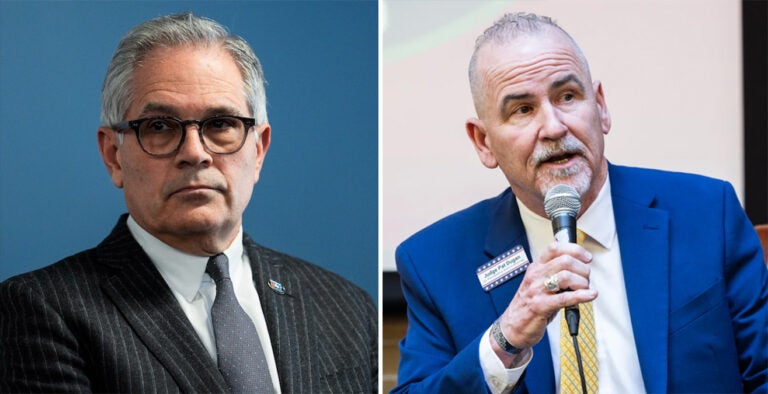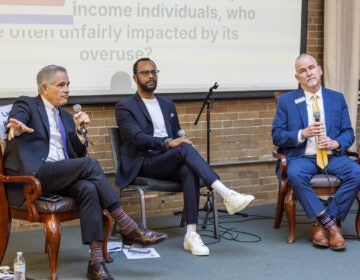Philadelphia election 2025: What to know about the DA race between Larry Krasner and Pat Dugan
Dugan, a former judge, lost the Democratic primary in May. This time around, he’s running as a Republican, after securing the nomination via write-in votes.

File: Philadelphia District Attorney Larry Krasner (left) at a news conference on March 11, 2024 and Pat Dugan at a campaign forum on March 11, 2025. (Matt Rourke/AP; Kimberly Paynter/WHYY)
From Philly and the Pa. suburbs to South Jersey and Delaware, what would you like WHYY News to cover? Let us know!
The 2025 Philadelphia district attorney’s race is unfolding as a highly unusual rematch — one that pits incumbent Larry Krasner against challenger Pat Dugan, this time across party lines.
Krasner, the progressive reformer who has led the city’s prosecutor’s office since 2018, fended off Dugan in a decisive Democratic primary in May and now faces him again in November after Dugan secured the Republican nomination via write-in votes.
Krasner won the Democratic primary with around 64% of the vote, carrying nearly all wards. Dugan garnered just over 35%. Given the absence of a Republican candidate before the general election cycle, that primary victory was widely interpreted as tantamount to reelection — until Dugan’s insurgent write-in campaign upended expectations.
That Dugan’s second attempt is considered a longshot in a city long considered a bastion of Democratic dominance where Krasner remains popular is reflected in a dearth of campaigning on either side. During the primary, Dugan ran professional campaign ads, including ones that attack Krasner, but those are missing this time around.
That’s likely a consequence of the fact Dugan raised less than $27,000 during the general election so far, considerably less than the nearly $1 million he brought in during the primary. Much of the earlier support came from area unions, which helped Dugan eclipse Krasner in fundraising and spending, but that has since dissipated during the general election.
However, with both now on the Nov. 4 ballot, Philadelphia voters still have a choice to make. Here’s the latest on the two candidates.
Larry Krasner: Incumbent reformer
Since first taking office in 2018, Larry Krasner, 63, has become one of the nation’s most prominent recognizable — and polarizing — figures in criminal justice. Elected in 2017 as part of a national wave of reform-minded prosecutors, Krasner entered office vowing to reshape the city’s approach to crime and punishment. His tenure has since defined Philadelphia as a testing ground for progressive prosecution — one focused on decarceration, police accountability and systemic reform.
During his tenure, he has effectively eliminated cash bail for most nonviolent offenses, prioritized treatment over incarceration and created a Conviction Integrity Unit that has exonerated more than 30 wrongfully convicted people. His approach has earned praise from national reform advocates but also fierce criticism from police unions, conservative lawmakers and some victims’ families who argue his policies have fueled lawlessness.
Born in St. Louis, Missouri, Krasner attended the University of Chicago and earned his law degree from Stanford University Law School. After relocating to Philadelphia, he began his career as a public defender before launching his own law firm, where he built a reputation as a fierce civil rights attorney. Over three decades, he represented protest movements including Black Lives Matter, Occupy Philadelphia and ACT UP, often pro bono. He also filed more than 75 civil rights lawsuits against the Philadelphia Police Department — a record that later shaped his approach to prosecutorial oversight.
Krasner’s first campaign for district attorney was fueled by public outrage over police shootings of unarmed individuals and the broader backlash to the Trump administration’s law-and-order agenda. Backed by $1.7 million from a political action committee funded by billionaire philanthropist George Soros, Krasner ran on a platform promising to end mass incarceration and prosecute police misconduct.
Once in office, Krasner quickly moved to implement sweeping changes. In his first year, he directed prosecutors to drop charges for simple marijuana possession, ended the use of cash bail for many misdemeanors and nonviolent felonies and recommended shorter prison sentences in plea deals. His office was instructed to weigh not only the harm caused by crimes, but also the financial cost of incarceration to taxpayers. He expanded diversion programs and emphasized rehabilitation over punishment, arguing that traditional prosecutorial approaches had failed to improve safety or fairness.
In 2019, Krasner challenged Pennsylvania’s death penalty system, filing a motion with the state Supreme Court that it was unconstitutional due to racial bias and wrongful convictions. His administration’s position marked a clear departure from past district attorneys and aligned Philadelphia with a growing national movement to end capital punishment.
But Krasner’s bold reforms have made him a lightning rod for critics who blame his policies for Philadelphia’s surge in gun violence during the pandemic years. Police unions and Republican lawmakers accused him of enabling lawlessness and demoralizing officers. In 2022, the Pennsylvania House of Representatives voted to impeach Krasner for alleged dereliction of duty, though the state Supreme Court later dismissed the proceedings. The Republican-led legislature also passed a law giving the state attorney general jurisdiction over cases within SEPTA transit stations — a direct rebuke of Krasner’s authority.
Despite these battles, Krasner has remained politically resilient. He easily won reelection in 2021, even amid record homicides and mounting criticism. Levels of crime — both violent and other — have dropped precipitously in the last year, but remain high in Philadelphia when compared to other cities.
Krasner has regularly used his platform to criticize President Donald Trump. Most recently, Krasner has condemned Trump’s deployments of the National Guard to Washington, D.C. and other cities, and said he would use legal means to fight back if troops were sent to Philadelphia, though Trump has never said he intends to. At a recent town hall, Krasner likened Trump supporters to “people who agree with Adolf Hitler when he said that equality is a degenerate notion.”
Although Krasner is running for a third term, he still describes himself as an outsider.
Pat Dugan: ‘Independent Democrat’
Born and raised in Philadelphia’s Fairmount neighborhood, Pat Dugan built his career around public service — first in the military, then in the courtroom. The son of a single mother, Dugan attended St. Joseph’s Preparatory High School on scholarship before enlisting in the U.S. Army Reserves in 1981 as a nuclear biological warfare specialist. He went on active duty two years later, serving as an airborne infantryman until 1989.
After returning home, Dugan earned his law degree from Rutgers-Camden Law School and spent more than a decade practicing law, focusing on cases involving children and low-income clients. Following 9/11 terrorist attacks, he reenlisted at age 42 and deployed to Iraq, where he helped conduct democracy training programs and served as a Judge Advocate General, or JAG, officer. Over his combined years of military service, Dugan earned multiple honors, including the Bronze Star, Combat Action Badge, Parachutist Badge, Expert Infantryman’s Badge and the Global War on Terrorism Service Medal.
In 2007, then–Gov. Ed Rendell appointed Dugan to the Philadelphia Municipal Court, where he later won election to a full term. As a judge, he became best known for establishing Philadelphia’s Veterans Court — a nationally recognized diversion program offering rehabilitation and alternative sentencing for veterans charged with crimes.
Dugan resigned from the bench in December 2024 to run for Philadelphia district attorney, arguing that the city’s justice system had tilted too far toward leniency. His platform centers on public safety, community engagement and prosecutorial accountability. He has proposed reorganizing the DA’s office into six regional divisions, each staffed by a dedicated prosecutor working directly with community members and victims. Dugan says he wants to “hold all criminals accountable” — but also to strengthen and expand diversion programs for nonviolent offenders, restoring balance between reform and enforcement.
Krasner has attempted to label him a “right-wing judge” aligned with Trump, but Dugan has sharply dismissed the comparison — calling the president “a nut” and emphasizing that he shares some reform goals with Krasner, even if he disagrees with the current DA’s execution of them. Dugan says he is still registered as a Democrat and now refers to himself as an “independent Democrat,” despite having accepted the Republican nomination for DA.
Asked why he thought he could win on the Republican ticket in an overwhelmingly Democratic city after having decisively lost the primary, Dugan referred to an expanded voter base and also pointed out that more than 83% of primary voters didn’t vote at all.
“That’s the big crime in this city,” he said.
On the issues: Prosecutorial philosophy and public safety
Maybe more than any other prosecutor in the U.S., Krasner has focused on criminal justice reform, seeing the office as an instrument for change when it comes to reducing mass incarceration rates. He has argued that incarceration does not reduce the prevalence of crime and emphasizes prevention through social programs, diversion and community investment. He encourages his prosecutors to seek leniency and diversion programs over incarceration for low-level offenses and to prioritize major crimes and wrongful convictions.
Dugan, on the other hand, is a moderate-to-centrist former judge who is emphasizing balance between reform and enforcement. He has framed his campaign around restoring “consistency and fairness,” saying that leniency has gone too far and undermined public trust. He particularly advocates tougher stances on repeat offenders and more visible prosecution of violent crimes. He argues that discretion has become “disconnection” with the community and proposes reorganizing the DA’s office into six geographic zones, each with prosecutors working directly with communities and victims.
Gun violence
Krasner views gun violence as a public health and safety crisis that requires a multipronged approach combining proactive prevention and modern enforcement. While his office prosecutes murder and other gun crimes, he emphasizes that the solution must also address root causes and requires a collective effort. Additionally, he’s supported the use of community-based violence prevention programs and opposes mandatory minimum sentences.
Dugan has called gun violence the city’s top crisis and says he wants more aggressive prosecution of gun crimes.
“This means placing veteran prosecutors on these cases, supporting witnesses through every court date, and holding monthly performance reviews with my geographic division leaders,” he said in a response to a questionnaire.
Cash bail
Krasner ended cash bail for most misdemeanors and nonviolent felonies, arguing it unfairly punishes the poor.
“Cashless bail systems are better at holding people who pose a threat to public safety in custody awaiting trial while not punishing the poor for lower-level crimes,” he said earlier this year in response to Trump’s executive order targeting states and jurisdictions that use the practice.
Dugan supports revisiting the policy. While he says he opposes blanket elimination, he believes bail decisions should weigh risk to public safety and not just the ability of the suspect to pay bail.
Police accountability and wrongful convictions
As DA, Krasner created a “do not call” list of officers with histories of issues like racial bias, dishonesty or other misconduct, who his office will not call on to serve on new cases. His office has also aggressively prosecuted police for excessive force and wrongful shootings. Police representatives have widely criticized Krasner and the local Fraternal Order of Police sued over his misconduct list. In his first year as DA, Krasner created the Conviction Integrity Unit, which has exonerated over 30 wrongfully convicted individuals.
Dugan’s Plan for Justice does not mention police accountability, but Dugan has said that it is important for the DA to give “unwavering support in prosecuting cases.” He added that, if elected, his office would review police investigations and hold them accountable if they break the law. He said he would continue the work of the Conviction Integrity Unit.
Sentencing and the death penalty
Krasner has ordered prosecutors to recommend shorter sentences for nonviolent and first-time offenders and to consider the cost of incarceration when making those recommendations. He publicly opposes capital punishment and filed a motion with the state Supreme Court declaring it unconstitutional.
Dugan favors individualized sentencing and rehabilitation but insists prosecutors must still seek prison time for violent offenders and he supports life sentences in egregious cases. He does not support abolition of the death penalty but supports limiting its use to extraordinary cases.
Drug crimes
Krasner has implemented a policy of not prosecuting simple marijuana possession and supports treatment-based alternatives for addiction-related offenses
Dugan backs diversion and treatment for addiction, but argues that repeat offenders must face escalating consequences to ensure accountability.

Get daily updates from WHYY News!
WHYY is your source for fact-based, in-depth journalism and information. As a nonprofit organization, we rely on financial support from readers like you. Please give today.








